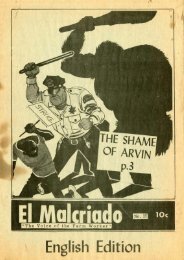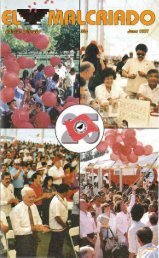You also want an ePaper? Increase the reach of your titles
YUMPU automatically turns print PDFs into web optimized ePapers that Google loves.
archos, are helping <strong>to</strong> raise funds for<strong>the</strong> <strong>strike</strong>rs. That support is one of <strong>the</strong>few issues <strong>that</strong> find Chicago Mayor RichardDaley, iconoc<strong>la</strong>stic Writer GloriaSteinem, and liberal Sena<strong>to</strong>rs Jacob Javitsand George McGovern in <strong>to</strong>ta<strong>la</strong>greement. Ralph Abernathy lends b<strong>la</strong>ckhelp <strong>to</strong> what is becoming <strong>the</strong> BrownPower movement.The fact <strong>that</strong> it is a movement hasmagnified <strong>la</strong> huelga far beyond its economicand geographic confines. At stakeare not only <strong>the</strong> interests of 384,100 agriculturalworkers in California but potentiallythose of more than 4,000,000in <strong>the</strong> U.S. Such workers have neverwon collective bargaining rights, partiallybecause <strong>the</strong>y have not been highlymotivated <strong>to</strong> organize and partiallybecause <strong>the</strong>ir often itinerant lives havemade <strong>the</strong>m difficult <strong>to</strong> weld in<strong>to</strong> a group<strong>that</strong> would have <strong>the</strong> clout of an industrialunion. By trying <strong>to</strong> organize<strong>the</strong> grape pickers, Chavez hopes <strong>to</strong> inspiremilitancy among all farm <strong>la</strong>borers.Because most of <strong>the</strong> grape pickers areMexican Americans, he also believes<strong>that</strong> he is fighting a battle on behalf of<strong>the</strong> entire Mexican-American community,which as a group constitutes <strong>the</strong> nation'ssecond biggest deprived minority.Unlettered and UnshodLike <strong>the</strong> b<strong>la</strong>cks, Mexican Americans,who are known as Chicanos, are a variedand diverse people. Only recentlyhave <strong>the</strong>y emerged from a stereotype:<strong>the</strong> <strong>la</strong>zy, p<strong>la</strong>cid peasant lost in a centuries-longsiesta under a sombrero. Unlike<strong>the</strong> b<strong>la</strong>cks, who were brought <strong>to</strong><strong>the</strong> U.S. involuntarily, <strong>the</strong> Chicanoshave flocked <strong>to</strong> <strong>the</strong> U.S. over <strong>the</strong> past30 years, legally and illegally, in an attempt<strong>to</strong> escape <strong>the</strong> poverty of <strong>the</strong>ir nativeMexico and find a better life. Whatever<strong>the</strong>ir present condition may be.many obviously find it better than <strong>the</strong>irformer one, as evidenced by <strong>the</strong> fact<strong>that</strong> re<strong>la</strong>tives have often followed familiesin<strong>to</strong> <strong>the</strong> U.S. The Chicanos donot speak in one voice but many, followno one leader or strategy. Theirlevel of ambition and militance variesgreatly from barrio <strong>to</strong> barrio betweenTexas and California.No man, however, personifies <strong>the</strong> Chicanos'bleak past, restless present andpossible future in quite <strong>the</strong> manner ofCesar Chavez. He was <strong>the</strong> unshod, unletteredchild of migrant workers. He attendeddozens of schools but never got<strong>to</strong> <strong>the</strong> eighth grade. He was a street-corner<strong>to</strong>ugh who now c<strong>la</strong>ims as his modelsEmiliano Zapata, Gandhi, Nehruand Martin Lu<strong>the</strong>r King. He tells hispeople: "We make a solemn promise:<strong>to</strong> enjoy our rightful part of <strong>the</strong> richesof this <strong>la</strong>nd, <strong>to</strong> throw off <strong>the</strong> yoke ofbeing considered as agricultural implementsor s<strong>la</strong>ves. We are free men andwe demand justice."The dawning of Chavez's socia<strong>la</strong>wareness came in a seamy San Jose,Calif., barrio called Sal Si Puedes-"Get out if you can." Through FredRoss, a tall, quiet organizer for SaulAlinsky's Community Service Organi-TIME, JULY 4, 1969zation, Cesar began <strong>to</strong> act on Alinsky'sprecept <strong>that</strong> concerted action is <strong>the</strong> onlymeans through which <strong>the</strong> poor can gainpolitical and economic power. Chavez,a Roman Catholic, has delved deeplyin<strong>to</strong> <strong>the</strong> papal social encyclicals, especiallyRerum Novarum and QuadragesimoAnno. ':' "What Cesar wanted <strong>to</strong>reform was <strong>the</strong> way he was treated asa man," recalls his bro<strong>the</strong>r Richard."We always talked about change, buthow could we go about it?" Cesar Chavezwent about it by working with <strong>the</strong>c.s.O. among Mexican Americans forten years. Then, in 1962, he left <strong>to</strong>form a farm workers' union.The conditions under which farm <strong>la</strong>borers<strong>to</strong>il have improved somewhatsince <strong>the</strong> squalid Depression era so wellevoked by John Steinbeck in The Grapesof Wrath and In Dubious Battle; yetfield work remains one of <strong>the</strong> most unpleasan<strong>to</strong>f human occupations. It demandslong hours of back-breaking<strong>la</strong>bor, often in choking dust amid insectsand under a f<strong>la</strong>ming sun. The harvest-timewage for grape pickers averages$1.65 an hour, plus a 25¢ bonusfor each box picked, while <strong>the</strong> currentfederal minimum wage is $1.60.Despite this, <strong>the</strong> seasonal and sporadicnature of <strong>the</strong> work keeps <strong>to</strong>tal incomefar below <strong>the</strong> poverty level. Averagefamily income is less than $1,600a year. There is no job security, andfringe benefits are few. If <strong>the</strong>y are migrants,<strong>the</strong> workers must frequently livein fetid shacks without light or plumbing(though housing, bad as it is, is frequentlyfree or very cheap.) As a result,many have moved <strong>to</strong> <strong>the</strong> cities,where even unskilled <strong>la</strong>bor can findwork at decent wages.Chavez was not <strong>the</strong> first <strong>to</strong> try <strong>to</strong> 01'-':' Rerum Noval'llm, published by Leo XITIin 1891, contended <strong>that</strong> <strong>the</strong> rich had in effect ens<strong>la</strong>ved<strong>the</strong> poor, and <strong>that</strong> every man has aright <strong>to</strong> a decent wage and reasonable comfort.Pius X1, in Quadragesil1lo Anno (1931),criticized <strong>the</strong> economic despotism <strong>that</strong> resultsfrom "limitless free competition" and reiterated<strong>the</strong> principle of a just wage.'00 25% <strong>to</strong> 50%5% <strong>to</strong> 25%247,000 { Popu<strong>la</strong>tion i150/0 having Spaganize farm workers. Ineffective efforts<strong>to</strong> found agricultural unions date back<strong>to</strong> <strong>the</strong> turn of <strong>the</strong> century. But only inHawaii, where Harry Bridges' <strong>to</strong>ughlongshoremen's union used its muscle<strong>to</strong> win <strong>the</strong> first farm-<strong>la</strong>bor contract forsugar-cane workers in 1945, did unionizationtake hold. Agriculture is outside<strong>the</strong> jurisdiction of <strong>the</strong> National LaborRe<strong>la</strong>tions Board, which has providedfederal ground rules for industrial workers'unions since 1935; on a nationallevel, <strong>the</strong>re is no simi<strong>la</strong>r mechanismfor farm workers. In May <strong>the</strong> Nixon Administrationproposed an independentFarm Labor Re<strong>la</strong>tions Board, butchances for passage of such a <strong>la</strong>w thisyear are small. Without NLRB protection,and with farm <strong>la</strong>bor normally transientand seasonal, <strong>the</strong> difficulties of organizingare enormous.Rose Grafts and Table GrapesUndeterred by <strong>the</strong>se obstacles, Chavez<strong>to</strong>ok his $1,200 in savings and started<strong>the</strong> National Farm Workers' Associationseven years ago, setting up its headquartersin <strong>the</strong> San Joaquin Valley agricultural<strong>to</strong>wn of De<strong>la</strong>no. He clickedoff 300,000 miles in a battered 1953Mercury station wagon, crisscrossing <strong>the</strong>San Joaquin and talking <strong>to</strong> more than50,000 workers in <strong>the</strong> first six months.His money was soon gone, but he foundpeople who were willing <strong>to</strong> give himfood. The N.F.W.A. had its first formalmeeting in Fresno in September 1962;287 people showed up. Chavez soonstarted a death-benefits p<strong>la</strong>n for hismembers, a curious echo of <strong>the</strong> burial societiesorganized decades ago by EasternEuropean immigrants on <strong>the</strong>ir arrivalin <strong>the</strong> U.S. He also set up acredit union with $35 in assets (it nowhas more than $50,000). By August1964, he had 1,000 members, each paying$3.50 a month in dues-no smallsum for a farm worker's family. Soonhe began publishing a union newspapercalled El Malcriado (The Misfit), whosecircu<strong>la</strong>tion is 18,000.At <strong>la</strong>st <strong>the</strong> union felt strong enough17





